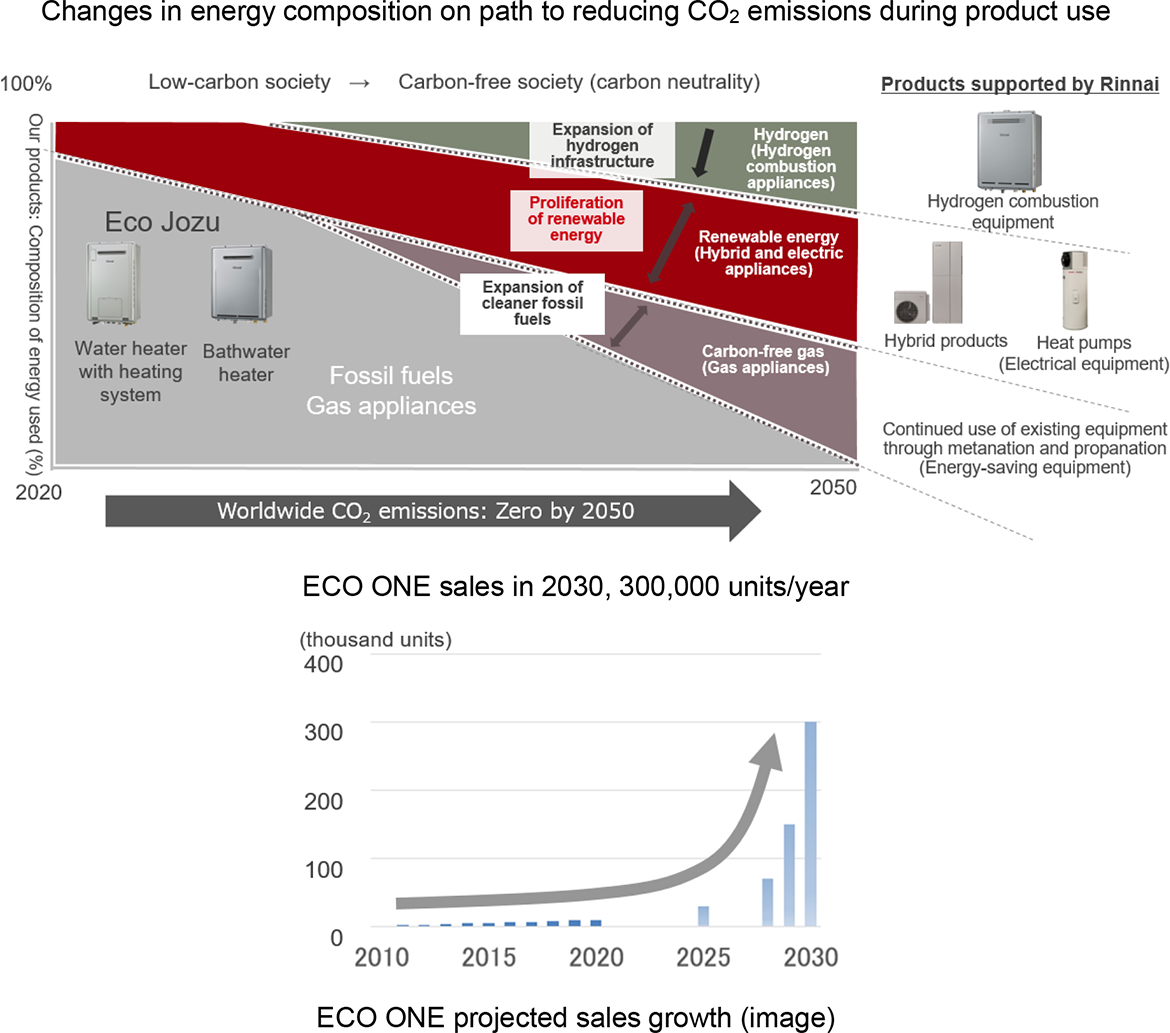11.05.2021
Group
Rinnai Group’s Path to Becoming Carbon-Neutral
Rinnai Corporation (head office: Nagoya City, Aichi Prefecture; president: Hiroyasu Naito) has formulated “Rinnai Group’s Path to Becoming Carbon-Neutral.”
Background to Carbon Neutrality
In response to the growing sense of crisis about global warming around the world, the Japanese government and relevant industries are stepping up efforts to realize a decarbonized society. The Rinnai Group, which handles household appliances that mainly use fossil fuels, has also set targets for 2030 and adopted a corporate policy to realize a decarbonized society by 2050.
In the life cycle of Rinnai products, CO2 emissions from product use account for an overwhelmingly large proportion. Accordingly, we recognize our responsibility to improve the environmental performance of the products we sell and promote the popularization of our environmentally friendly products. The table below shows our targets for CO2 emissions from our business activities (product development, manufacture, and sale/distribution) and product use (usage and disposal) in the life cycle.
| 2020 (result) | 2030 (target) | 2050 (target) | ||
| Business activities |
Domestic | 30,000 t-CO2 | 15,000 t-CO2 | Zero |
| Global | 100,000 t-CO2 | 50,000 t-CO2 | Zero | |
| When products are used |
Domestic | 16,800,000 t-CO2 | 12,600,000 t-CO2 | Zero |
| Global | 45,000,000 t-CO2 | - | Zero | |
Initiatives and Direction to Realize Low-Carbon and Decarbonized Society
To reach our “low-carbon targets” for 2030, we will accelerate the spread and expansion of high-efficiency Eco-Jozu water heaters and ECO ONE hybrid water heaters with heating systems, which we have been actively promoting. To this end, we will increase sales of ECO ONE, which reduces CO2 emissions by around 50% compared with conventional water heaters, to 300,000 units per year by 2030. To reach our “decarbonization” target for 2050, we will closely monitor the development of technologies, such as methanation and propanation, and explore the potential for continued use of conventional equipment. At the same time, we will pursue a long-term business strategy by developing systems that combine hydrogen combustion equipment and hybrid water heaters with renewable energy technologies.

Reducing CO2 Emissions from Business Activities
To reduce CO2 emissions from our business activities, we will purchase green electricity and introduce non-fossil-fuel equipment at our factories and offices, in order to achieve zero Scope 2 emissions in Japan by 2030 and overseas by 2050, and zero Scope 1 emissions in both Japan and overseas by 2050.
| Japan | Overseas | |
| Scope 1 (gas, fuel) | Zero by 2050 | |
| Scope 2 (electricity) | Zero by 2030 | Zero by 2050 |
Investing in Carbon Neutrality
Including the above activities, we plan to invest ¥50 billion or more in carbon neutrality over a cumulative five-year period. By investing aggressively to become carbon neutral, we will accelerate innovation in product development, manufacturing, and sales.
| Main investment activities | Investment amount | |
| Product development |
|
¥30 billion or more |
| Manufacturing |
|
¥15 billion or more |
| Sales |
|
¥5 billion or more |
| Total | ¥50 billion or more | |
In Summary
In conjunction with this announcement of “Rinnai Group’s Path to Becoming Carbon-Neutral,” we promote internal and external activities under the name Rinnai Innovation Manifesto 2050 (RIM 2050). Through innovation in product development, manufacturing, and sales, Rinnai aims to “help realize a decarbonized society” by transcending the boundaries of its conventional business domains.
In addition to creating healthy and comfortable ways of living, the Rinnai Group will strive to help realize a decarbonized society by 2050 through various activities related to the development, manufacture, and sales of household appliances and other products.
For more information, please visit website below:
Rinnai Group’s Path to Becoming Carbon Neutral
Note: The information contained herein is valid as of the date of release. Please be aware that certain details may change or be made irrelevant by circumstances that emerge at a later date.
